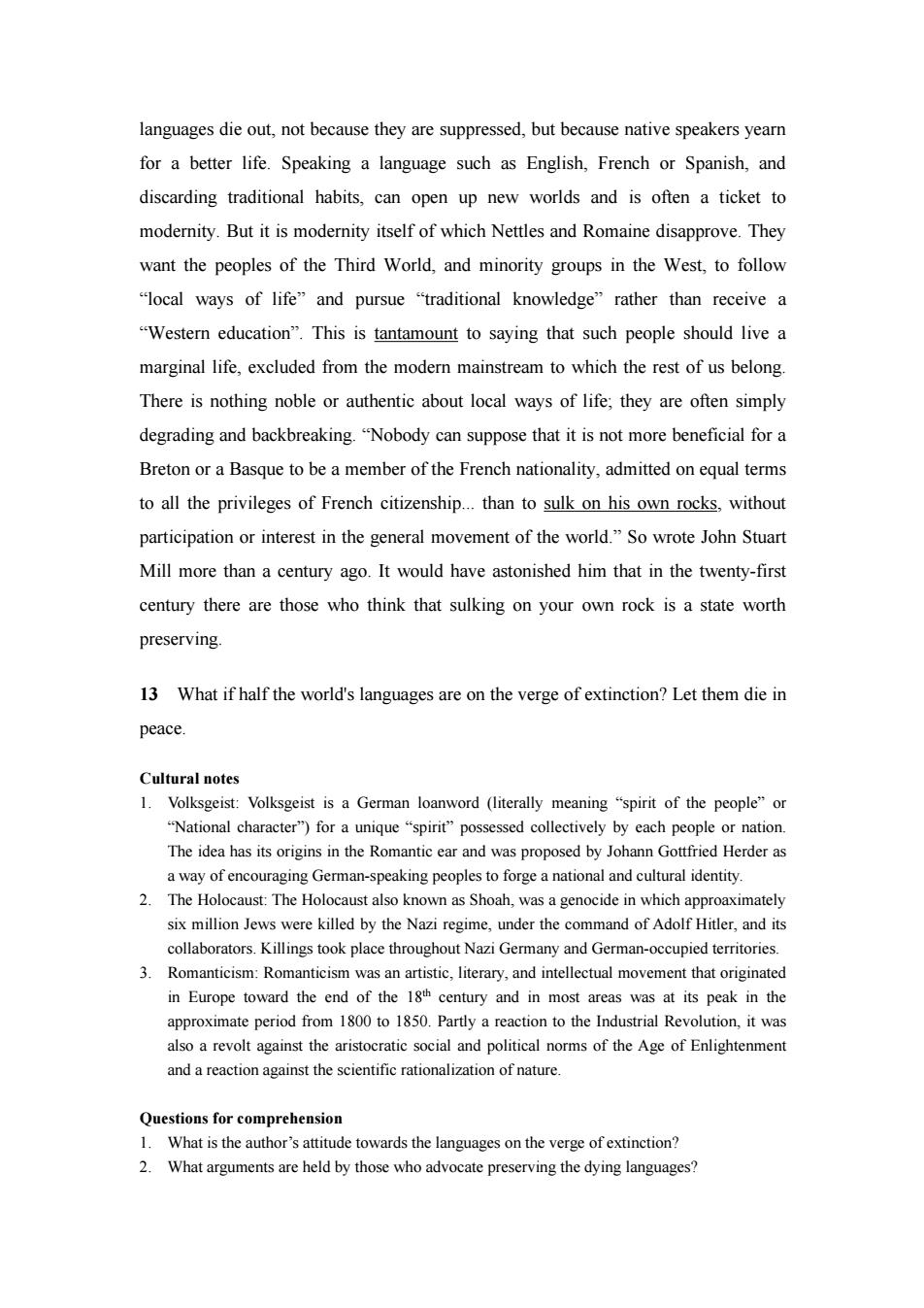正在加载图片...

languages die out,not because they are suppressed,but because native speakers yearn for a better life.Speaking a language such as English,French or Spanish,and discarding traditional habits,can open up new worlds and is often a ticket to modernity.But it is modernity itself of which Nettles and Romaine disapprove.They want the peoples of the Third World,and minority groups in the West,to follow "local ways of life"and pursue "traditional knowledge"rather than receive a "Western education".This is tantamount to saying that such people should live a marginal life,excluded from the modern mainstream to which the rest of us belong. There is nothing noble or authentic about local ways of life;they are often simply degrading and backbreaking."Nobody can suppose that it is not more beneficial for a Breton or a Basque to be a member of the French nationality,admitted on equal terms to all the privileges of French citizenship...than to sulk on his own rocks,without participation or interest in the general movement of the world."So wrote John Stuart Mill more than a century ago.It would have astonished him that in the twenty-first century there are those who think that sulking on your own rock is a state worth preserving 13 What if half the world's languages are on the verge of extinction?Let them die in peace Cultural notes 1.Volksgeist:Volksgeist is a German loanword (literally meaning "spirit of the people"or "National character")for a unique "spirit"possessed collectively by each people or nation. The idea has its origins in the Romantic ear and was proposed by Johann Gottfried Herder as a way of encouraging German-speaking peoples to forge a national and cultural identity. 2.The Holocaust:The Holocaust also known as Shoah,was a genocide in which approaximately six million Jews were killed by the Nazi regime,under the command of Adolf Hitler,and its collaborators.Killings took place throughout Nazi Germany and German-occupied territories. 3.Romanticism:Romanticism was an artistic,literary,and intellectual movement that originated in Europe toward the end of the 18th century and in most areas was at its peak in the approximate period from 1800 to 1850.Partly a reaction to the Industrial Revolution,it was also a revolt against the aristocratic social and political norms of the Age of Enlightenment and a reaction against the scientific rationalization of nature. Questions for comprehension 1.What is the author's attitude towards the languages on the verge of extinction? 2.What arguments are held by those who advocate preserving the dying languages?languages die out, not because they are suppressed, but because native speakers yearn for a better life. Speaking a language such as English, French or Spanish, and discarding traditional habits, can open up new worlds and is often a ticket to modernity. But it is modernity itself of which Nettles and Romaine disapprove. They want the peoples of the Third World, and minority groups in the West, to follow “local ways of life” and pursue “traditional knowledge” rather than receive a “Western education”. This is tantamount to saying that such people should live a marginal life, excluded from the modern mainstream to which the rest of us belong. There is nothing noble or authentic about local ways of life; they are often simply degrading and backbreaking. “Nobody can suppose that it is not more beneficial for a Breton or a Basque to be a member of the French nationality, admitted on equal terms to all the privileges of French citizenship... than to sulk on his own rocks, without participation or interest in the general movement of the world.” So wrote John Stuart Mill more than a century ago. It would have astonished him that in the twenty-first century there are those who think that sulking on your own rock is a state worth preserving. 13 What if half the world's languages are on the verge of extinction? Let them die in peace. Cultural notes 1. Volksgeist: Volksgeist is a German loanword (literally meaning “spirit of the people” or “National character”) for a unique “spirit” possessed collectively by each people or nation. The idea has its origins in the Romantic ear and was proposed by Johann Gottfried Herder as a way of encouraging German-speaking peoples to forge a national and cultural identity. 2. The Holocaust: The Holocaust also known as Shoah, was a genocide in which approaximately six million Jews were killed by the Nazi regime, under the command of Adolf Hitler, and its collaborators. Killings took place throughout Nazi Germany and German-occupied territories. 3. Romanticism: Romanticism was an artistic, literary, and intellectual movement that originated in Europe toward the end of the 18 th century and in most areas was at its peak in the approximate period from 1800 to 1850. Partly a reaction to the Industrial Revolution, it was also a revolt against the aristocratic social and political norms of the Age of Enlightenment and a reaction against the scientific rationalization of nature. Questions for comprehension 1. What is the author’s attitude towards the languages on the verge of extinction? 2. What arguments are held by those who advocate preserving the dying languages?